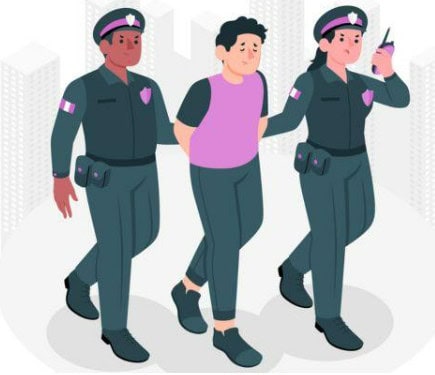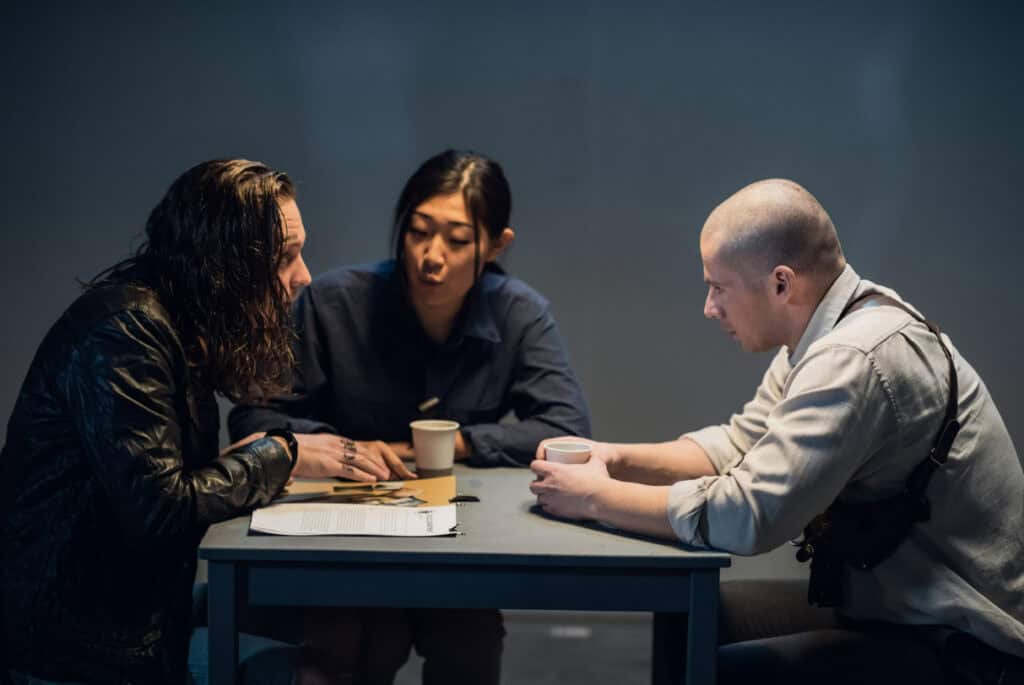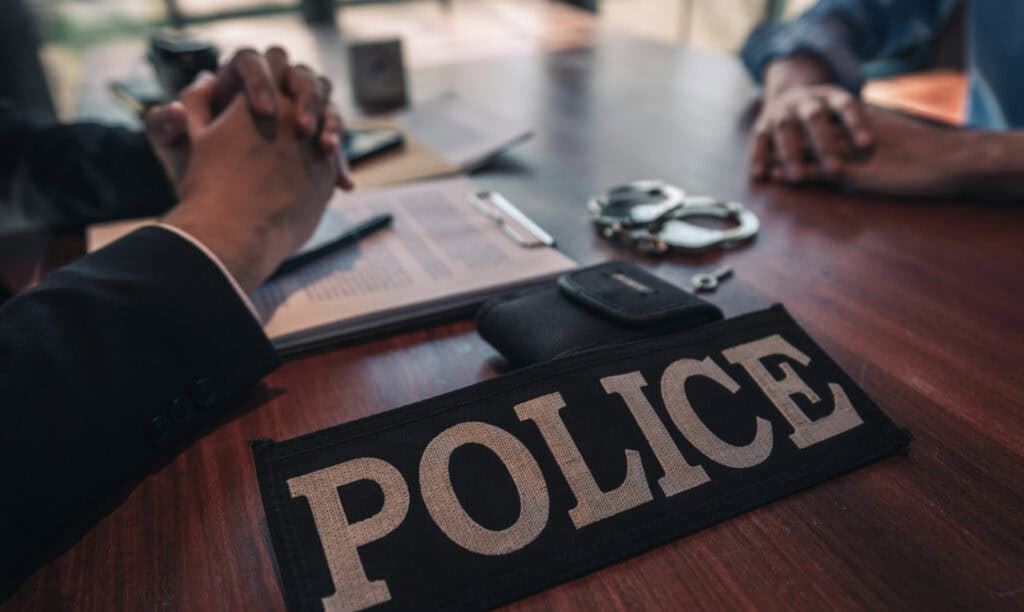Have you ever been pulled over by the police and felt that knot of anxiety tighten in your stomach? Or maybe you’ve seen dramatic scenes in movies where detectives grill suspects in high-pressure situations.
Table of Contents
But in reality, what are your rights during an interrogation, and how can you protect yourself?
Under the Fifth Amendment of the United States Constitution, citizens have the right to remain silent and not incriminate themselves. This means you do not have to answer any questions that may be used against you in a court of law. Understanding this important right is crucial for protecting yourself during a police interrogation.

Knowledge about the course of action during detention is important. It helps you avoid making mistakes, ones that could land you in more trouble than you already are.
This article lists five key questions that you should ask during police interrogation to protect your rights. Let’s dive in.
The Right to Remain Silent: Your Most Powerful Tool
Before we discuss the questions you should ask during a police interrogation, it’s important to understand why exercising your right to remain silent is crucial. This right is often called the Miranda Rights, named after a landmark US Supreme Court case establishing this protection in 1966.
When a person is arrested or taken into custody by law enforcement, they must be informed of their Miranda Rights before being interrogated. These rights include the famous phrase “you have the right to remain silent,” the right to an attorney, and the warning that anything you say can and will be used against you in a court of law.
This means that if the police are questioning you, you have the right to stay quiet and not answer any questions. You do not have to provide any information or make any statements that could potentially incriminate you. This is your most powerful tool for protecting yourself during a police interrogation.

5 Key Questions You Should Ask
If you find yourself in an interrogation room, here are five key questions you should ask to protect your rights and legal defense.
1. Am I Free to Leave?
The purpose of asking, “Am I free to leave?” is to determine if you are under arrest or if the police are legally detaining you.
If the officers respond affirmatively, you can leave the premises immediately and are not obligated to answer any more questions. This question helps clarify your status and can prevent any mistaken belief that compliance is mandatory when it may not be.
However, if the answer is no and you believe you are being unlawfully detained, it is crucial to remain calm and not resist physically. Clearly state that you do not consent to the detention and ask for the reason behind it.
Document any details you can remember, including the officers’ names and badge numbers, and seek legal counsel immediately. It is vital to handle the situation professionally and let your attorney address any legal violations that may have occurred.
2. What is the Specific Reason I Am Here Today?
This question might seem obvious, but getting clear details is important. The officer might be investigating a crime you witnessed, or they might suspect you’re involved in something more serious.
Knowing the specific reason you’re there helps you understand the situation. For example, if they suspect you of a crime you didn’t commit, you’ll be better prepared to explain your innocence.
However, you might be more comfortable answering their questions if you’re simply a witness. The bottom line? Knowing the accusation allows you to decide whether answering further questions is in your best interest.
3. Can You Explain the Evidence Against Me, If Any?
This question is a smart way to gather information without admitting guilt. By asking about the evidence, you’re letting the officer know you want to understand the situation. They might reveal details about the investigation, which can be helpful.
Remember, you have no obligation to answer questions about specific evidence. But if they choose to share some information, it can help you decide your next steps. It’s important to stay calm and avoid getting defensive. The goal is to gain a basic understanding, not to challenge the investigation. That job is best left to your legal counsel.
4. May I See a Copy of the Miranda Warning? (Optional depending on jurisdiction)
The Miranda Warning is a critical advisement of rights that law enforcement officers must provide to individuals upon arrest or before an interrogation begins.
Originating from the landmark 1966 US Supreme Court case Miranda v. Arizona, these warnings are designed to inform you of your rights, including the right to remain silent and the right to an attorney.
Typically, the warning includes statements such as “You have the right to remain silent. Anything you say can and will be used against you in a court of law. You have the right to an attorney. If you cannot afford an attorney, one will be provided to you.”
Requesting a copy of the Miranda Warning can be a strategic move during an interrogation, although it is not always necessary. It might provide a tangible reference to your rights, helping you feel more secure and ensuring that law enforcement follows proper legal protocol.
However, providing a written copy in some jurisdictions is not a standard practice. Regardless, verbally affirming your understanding of your rights is typically deemed sufficient.
5. May I Have My Phone to Contact a Lawyer?
Legal representation during an interrogation is paramount for protecting your rights and ensuring that you do not inadvertently incriminate yourself.
A lawyer is your advocate and can help you navigate the complex legal landscape, offering advice on what to say—and, more importantly, what not to say. When you’re in a high-pressure situation, such as a police interrogation, having a lawyer by your side can safeguard against potential legal missteps.
You have the right to request a lawyer during an interrogation. When you ask for legal counsel, all questioning by law enforcement should cease until your attorney is present.
This right is part of the Miranda Warning, and you must exercise it if you feel uncertain about the questions being asked or the direction of the interrogation. Failure to request a lawyer can have significant consequences; anything you say can and will be used against you in court.
Without legal representation, you might unintentionally say something that could be misinterpreted or used to build a case against you. Therefore, asking for your phone to contact a lawyer is not just a procedural step—it’s a critical measure to protect your legal rights and ensure that you receive fair and just treatment under the law.

Additional Tips for Police Interrogation
Remember, staying calm, polite, and respectful is key throughout the interaction. Even if you feel stressed, courtesy goes a long way. Here are some additional tips to keep in mind:
- Don’t answer questions you don’t understand. Ask for clarification if needed.
- If you’re uncomfortable answering a question, politely say so.
- Remember, you have the right to remain silent. Don’t feel pressured to talk.
Seeking Legal Counsel
Even if you believe you’re innocent, consider contacting an attorney after an interrogation. They can review the details of your interaction with the police and offer valuable legal advice.
Remember, an attorney is there to protect your rights and ensure you navigate the legal system effectively.



